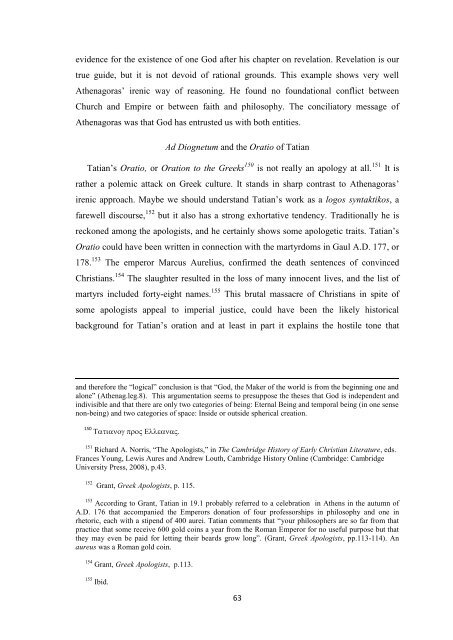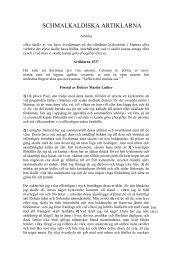MYSTERY REVEALED
MYSTERY REVEALED
MYSTERY REVEALED
Create successful ePaper yourself
Turn your PDF publications into a flip-book with our unique Google optimized e-Paper software.
evidence for the existence of one God after his chapter on revelation. Revelation is our<br />
true guide, but it is not devoid of rational grounds. This example shows very well<br />
Athenagoras’ irenic way of reasoning. He found no foundational conflict between<br />
Church and Empire or between faith and philosophy. The conciliatory message of<br />
Athenagoras was that God has entrusted us with both entities.<br />
Ad Diognetum and the Oratio of Tatian<br />
Tatian’s Oratio, or Oration to the Greeks 150 is not really an apology at all. 151 It is<br />
rather a polemic attack on Greek culture. It stands in sharp contrast to Athenagoras’<br />
irenic approach. Maybe we should understand Tatian’s work as a logos syntaktikos, a<br />
farewell discourse, 152 but it also has a strong exhortative tendency. Traditionally he is<br />
reckoned among the apologists, and he certainly shows some apologetic traits. Tatian’s<br />
Oratio could have been written in connection with the martyrdoms in Gaul A.D. 177, or<br />
178. 153 The emperor Marcus Aurelius, confirmed the death sentences of convinced<br />
Christians. 154 The slaughter resulted in the loss of many innocent lives, and the list of<br />
martyrs included forty-eight names. 155 This brutal massacre of Christians in spite of<br />
some apologists appeal to imperial justice, could have been the likely historical<br />
background for Tatian’s oration and at least in part it explains the hostile tone that<br />
and therefore the “logical” conclusion is that “God, the Maker of the world is from the beginning one and<br />
alone” (Athenag.leg.8). This argumentation seems to presuppose the theses that God is independent and<br />
indivisible and that there are only two categories of being: Eternal Being and temporal being (in one sense<br />
non-being) and two categories of space: Inside or outside spherical creation.<br />
150 .<br />
151 Richard A. Norris, “The Apologists,” in The Cambridge History of Early Christian Literature, eds.<br />
Frances Young, Lewis Aures and Andrew Louth, Cambridge History Online (Cambridge: Cambridge<br />
University Press, 2008), p.43.<br />
152 Grant, Greek Apologists, p. 115.<br />
153 According to Grant, Tatian in 19.1 probably referred to a celebration in Athens in the autumn of<br />
A.D. 176 that accompanied the Emperors donation of four professorships in philosophy and one in<br />
rhetoric, each with a stipend of 400 aurei. Tatian comments that “your philosophers are so far from that<br />
practice that some receive 600 gold coins a year from the Roman Emperor for no useful purpose but that<br />
they may even be paid for letting their beards grow long”. (Grant, Greek Apologists, pp.113-114). An<br />
aureus was a Roman gold coin.<br />
154 Grant, Greek Apologists, p.113.<br />
155 Ibid.<br />
63



